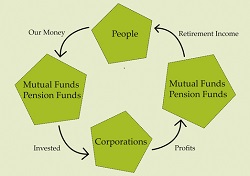|
People, Profits, & Pensions |
|
Pipeline Blues
Monday, February 10, 2014
That's not happy news for the many institutional investors that count on Boardwalk to help fund their retirement incomes, whether mutual funds or pension funds. According to nasdaq.com, more than 70% of BWP belongs to institutional investors. All together, 238 investors hold more than 170 million shares. In a news release this morning, the company announced big declines in its net earnings and a cut to its dividend, "Boardwalk Pipeline Partners, LP, (BWP) announced today that it has declared a quarterly cash distribution per common unit of $0.10 ($0.40 annualized) payable on February 27, 2014, to unitholders of record as of February 20, 2014. The reduction in the distribution will free up internally generated cash to help fund growth and reduce leverage in order to strengthen the balance sheet during the difficult market conditions impacting the Partnership." For the past year, Boardwalk has been paying a quarterly dividend of $0.5325. So, for institutional investors, this cut will cost them (170,487,039 shares x $0.4325) more than $73 million a quarter. Pension funds and many mutual tend to have a long-term perspective, so they may not be jumping out of the stock this morning. In fact, it's hard for institutional investors to move large volumes of stock without negatively affecting the price they pay or receive. Of course, for every seller who wants out, there has to be someone on the other side of the transaction who sees this price as an opportunity to get into BWP at a bargain price. The Bigger Picture:Will Profits from Big Macs Add to Your Retirement Income?In 1948, the McDonald brothers redesigned and remodelled their drive-in restaurant in San Bernardino, California. Taking inspiration from Henry Ford's assembly-line, they created the fast food revolution, with the quick service and low prices we now take for granted. In that same year, the U.S. National Labor Relations Board ruled unions could include pension issues in contract negotiations. That ignited a massive expansion of pension plans. In the 1950s, pension funds started buying stocks, rather than just bonds or their equivalents; in addition mutual funds came of age. With these two developments working, middle class people became owners of big business. At first, their stakes were modest, but steadily growing. And in just a few decades, they gained controlling interests in many large corporations through their funds. Management guru Peter Drucker has called it, "...one of the most startling power shifts in economic history." Now, working people reap the benefits of those investments, collecting much of the profit distributed by McDonald's and other big corporations. Discover how the pieces fit together. In Big Macs & Our Pensions: Who Gets McDonald's Profits? - a new booklet -(about 25-pages), you will:
You may not be among the owners of McDonald's. But if you belong to any pension plan, or contribute to a mutual fund or whole life insurance policy, you likely own pieces of some big corporations. More importantly, though, your retirement income will be bigger and grow more dependably than you would otherwise expect. Big Macs & Our Pensions: Who Gets McDonald's Profits? is now available at Amazon.com
|

The Ownership Cycle
Copyright 2014. Robert F. Abbott, All Rights
Reserved.
|

 By: Robert F. Abbott, author of
By: Robert F. Abbott, author of  Boardwalk Pipeline Partners (BWP) announced its Fourth Quarter 2013 results this morning, and
promptly saw its stock price knocked down by nearly 40%.
Boardwalk Pipeline Partners (BWP) announced its Fourth Quarter 2013 results this morning, and
promptly saw its stock price knocked down by nearly 40%.